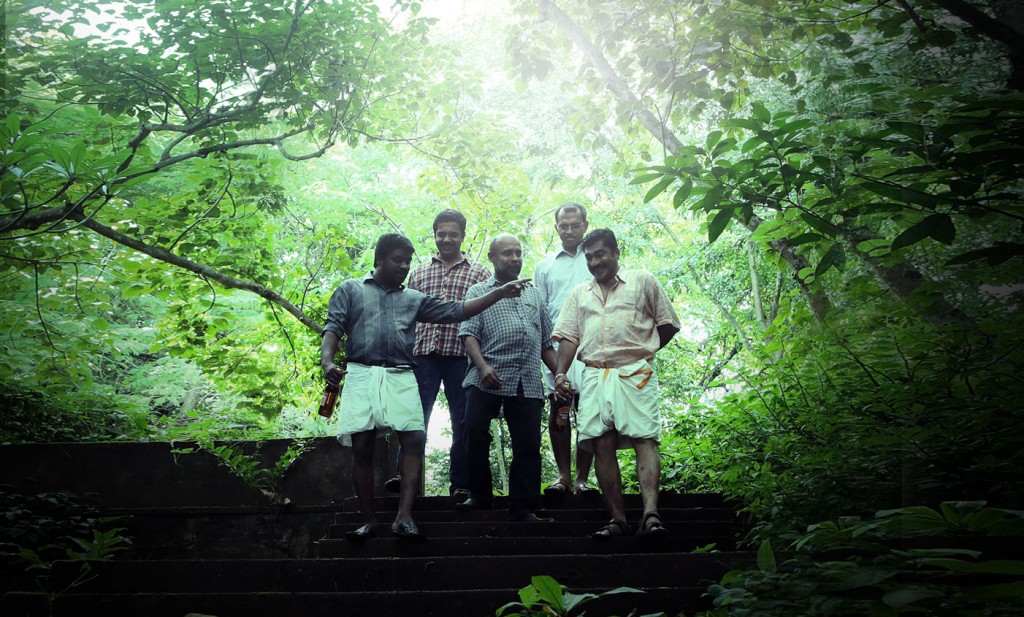In one of his poems, Ayyappa Panicker paraphrases Sri Narayana Guru, the great social reformer of Kerala, “Don’t tell caste, don’t ask caste, but never do anything, forgetting it.” Sanal Kumar Sasidharan’s Ozhivu Divasathe Kali (An Off Day Game, based on a story by R Unni ) is about how casteism works through the social, political and cultural sinews of Kerala. It portrays how caste bias functions in a society that boasts endlessly about being progressive (a ‘model’ to the world) and flaunts a long history of renaissance movements and anti-caste struggles. However, scratch the surface and you can see its unwritten norms and strictures very much at work in spaces and situations where it really matters.
Significantly, Ozhivu Divasathe Kali begins amidst the high-pitched hustle and bustle during the final hours of the last day of an election campaign in a small town in Kerala. From here, director Sanal Kumar picks his group of characters – five friends who move away from the campaign to have a swig by the canal side. Like a typical Malayalee male group one finds everywhere in Kerala, it is an everyday gathering, where they drink and talk about all kinds of things; they crack jokes, discuss politics, comment upon the elections, before they zero in on planning how to ‘celebrate’ the following day, the polling day, which is also a dry day.
The rest of the film unfolds during and after their journey to a remote building in a jungle, where they spend their ‘off day’. This journey is also one into their innards, revealing it all its primal instincts and bestial nature. Their drinking bout and banter are punctuated with references to the Emergency, Gulf migration, politics and democracy, all setting the historical backdrop to the tragic caste drama they enact. Every time push comes to shove, it is the underclass amongst them who has to pay the final price and ‘live up’ to the worst of other people’s whims. It is the dark-skinned Dasan (literally meaning servant) who has to climb the tree to pluck the jackfruit or kill the cock for their curry and also pacify them during their fights. Significantly, he is the only one among them who is interested in the election reports blaring on television. The other representative of the underclass is the woman who cooks for them. All the visitors, barring Dasan, have their eyes on her, and try in their own devious ways – through gestures, not so subtle hints and even force – to lure her into their grasp. She resolutely avoids them and when the most macho among them, Dharman, tries to grab her, she gives him a sound slap before leaving the place. But in the case of Dasan, he is not an outsider like her. On the contrary, he is very much a part of the circle of that illusory friendly fraternity, that seems to include him yet very subtly keeps him down and out.
As the friendly drinking party progresses, it gradually transforms into a primal game of power and violence, the rules of which like any social game in India, finally boil down to the rules of chaturvarnya, the hierarchical rules that bind every aspect of India . It is a game reveals the workings of caste unconscious in us and our society. And like any system of unjust, brute power, that is first covert and then overt, this congregation too ultimately demands and enforces the sacrifice of the powerless, which is what their game finally culminates in. The journey of this all male gang to the remote jungle hideout, the ‘off day’ of the elections, their wanton inebriation, the election news from the television in the background, the way they all hover lewdly around the girl who cooks for them – all add a certain diabolic, metaphorical charge and resonance to the fatal drama.
The narrative is structured as a series of long takes that follow the movement and dialogues of the characters, the verdant exteriors that envelop them, and the morbid interiors of the desolate ‘guest house’ they party in. The actors in the film (Nisthar Ahmed, Pradeepkumar, Girish Nair, Baiju Netto, Raju Pillai, Arun Nayar, Abhija Sivakala and Sridhar PU) are all theatre artists whose improvised dialogue and performances add to the everyday, next door quality of the narrative. The deliberate disavowal of montage and the insistence on continuous takes further emphasize the spontaneous quality of events, and thus, the political import of the theme.
All in all, Sanal Kumar’s Ozhivu Divasathe Kali, along with Shanavas Nuranipuzha’s Kari, tellingly brings caste once again to the centre stage of Malayalam cinema, which, for a long time has been ruled by and engrossed in upper caste male imagination and concerns.
Malayalam, Drama, Color



Hi..where can I find this movie to buy or download?